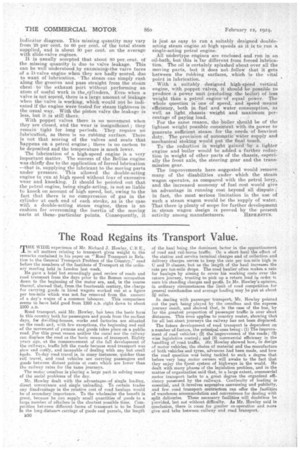The Road Regains its Transport Value.
Page 14

If you've noticed an error in this article please click here to report it so we can fix it.
MHE WIDZ experience of Mr, Richard J. Howley, C.1.3.E., ie all matters relating to transport gives weight to the remarks contained in his paper on "Road Transport in Relation to the General Transport Problem of the Country," read before the members of the Institute of Transport at the ordinary meeting held in Landon last week.
1-le gave a brief but exceedingly good review of roads and road transport from the days prior to the Roman occupation down to the beginning of the motor era' and, in the course thereof, showed that, from the fourteenth century, the charge for Carrying goods in hired wagons worked out at a figure per ton,mile which was not fax removed from the, amount of a day's wages of a common labourer. This comparison seems to have held good from 1260 A.D. right down to about 1800 an.
Road transport, said Mr. Howley, he been the basic forth in this country both for passengers and goods from the earliest days, for dwelling-housee, works and faCtories are situated on the road; and, with few exceptions, the beginning and end of the movement of pereens and goods takes place on a public road.. For this great reason neither the canal nor the railway can displace the road as the'basie means of transport. Eighty years ago, at the -commencement of the full development of the railways' traffic left the roads because road transport was slow and costly, and incapable of dealing with any but small leads. To-day road travel is, in Many 'instances, quicker than rail travel, and road vehicles are carrying passengers and goods between distant points at costs which are lower than the railway rates for the same journeys.
The motor omnibus is playing a large part in solving many of the social problems of the day.
Mr. Howley dealt with the advantagess.of single loading, direct conveyance and single unloading. To certain trades any disadvantage in the relative. cost of road haulage would be of secondary importance. To the wholesaler the benefit is great, because he can supply small quantities of goods to a large number of rgtailers in the shortest possible time. Cornpetition between different forms of. transport is to be found In the long-distance. carriage of goods-and parcels, the length
• B30
of the .haul being the dominant factor in the apportionment of road and rail-borne traffic. On a short haul the effect of the station and service terminal charges and of collection and delivery charges serves to keep the rate per ton-mile high in C and I) classes, hut as the length of the haul increases the rate per ton-mile drops. The road haulier often makes a rate for haulage by aiming to cover his working costs over the return journey, trusting to pick up a return load in order t.,c earn his standing charges and profit. In Mr. Howley's opinion, -in ordinary circumstances the limit of road competition for general merchandise and average loading may he put at 'about
50 miles. • .
In dealing with passenger transport, Mr. Howley pointed out the .part being played by the omnibus au& the express journey coach, and showed that, in the Gas* of the bus, 'by far the greatest proportion of passenger traffic is over short distances. This even applies to country routes, showing that her all but short journeys the railway has net been displaced.
The future development of road transport is dependent ore a number of factors, the principal ones being : (1) The improvement of road vehicles; (2) the improvement of the roads; (3) wise legislative control; and {4} eommerrial efficiency in the handling of road traffic. ;Ate Howley showed how, in design of motor vehicles,' the choice Of material and the manufacture of both vehicles and' tyres, advances had been made, and how •
the road question was being tackled to such a degree that before 'very long motor owners will awake to the fact that they enjoy the finest system of highways in the world. He dealt with many phases of the legislation problem, and in the matter of organisation said that, to a large extent, commercial motor transport lacks to a great 'degree the organized efficiency possessed by the railways. Continuity of loading is essential, and it•involves expensive canvassing and publicity, and few,., road transport contractors an offer the facdlities of warehouse accommodation and convenience for dealing with split deliveries. These necessary facilities will doubtless he provided, but not without difficulty. As Mr. Rowley said in pi-mansion, there is room for greater co-operation end more give and take between .railwa,y and road transport. '•






























